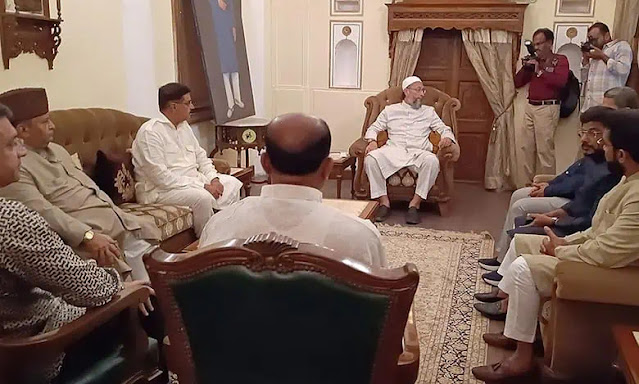In the aftermath of the just concluded Assembly elections in Telangana, the resounding support of the Muslim community for the Congress party has created a paradox for the newly appointed Chief Minister, A. Revanth Reddy. Despite the overwhelming backing, none of the Muslim candidates fielded by the party emerged victorious.
The absence of a Muslim face in the Cabinet has posed a significant challenge for Chief Minister with the Congress high command deciding not to include any defeated candidate. This decision has further compounded matters, making the task of providing representation to a community that played a pivotal role in securing the Congress party’s triumph that more difficult.
It is the first time in the history of the combined Andhra Pradesh and Telangana that no Muslim minister is inducted, a notable shift in the region’s political landscape. In a way for the first time there’s a ‘Muslim-mukt (Muslim free) Cabinet the State. Barring the seven MLAs of the All India Majlis Ittehadul Muslimeen (AIMIM), no Muslim candidate from either the Congress or the Bharat Rashtra Samithi (BRS) could make it to the Assembly. The Congress fielded six Muslim candidates and the BRS three.
Among the defeated Congress candidates, the seasoned leader and former minister, Muhammad Ali Shabbir, finds himself on the sidelines along with former Indian cricket captain, Muhammad Azharuddin and Feroz Khan who unsuccessfully contested the election thrice earlier.
The composition of the 11-member Cabinet announced yesterday has led to both appreciation and disappointment. The Congress party in an attempt to strike a balance, ensured representation for all castes and communities, acknowledging the role played by various sections in its electoral success. However, the absence of a Muslim representative in the Cabinet has left the community disheartened.
Despite their significant support that contributed to the Congress storming to power after a decade, the absence of a Muslim minister in the newly formed Cabinet has become a focal point of concern and talk of the town. There is also a sense of disappointment among the NRI Muslims of Telangana. These members of the Diaspora, who have maintained a keen interest in the political development of their home State, had hoped for the induction of a Muslim representative in the Cabinet. The absence of such representation has resonated even among those outside the national borders, adding a global dimension to the community’s concerns.
A community leader lamented, “The Chief Minister has ensured a perfect caste balance with due recognition to women and weaker sections. But the only sore thing is that there is no Muslim minister in the new Cabinet.”
The Telangana Council of Ministers has the potential to expand its strength to a maximum of 18 members, providing a window for adjustments. Recognizing the palpable disappointment within the Muslim community, there is speculation that the Congress high command may address this gap in representation during subsequent Cabinet expansions. The focus is not necessarily limited to previously fielded candidates but extends to including prominent individuals from the community. One or two Muslims are expected to be nominated to the Legislative Council, paving way for their inclusion in the Cabinet. Muhammad Ali Shabbir is widely perceived as the natural choice given his experience. But his continuous drubbings at the hustling in the previous elections might come in the way, it is said. Chances of Azharuddin, the other prominent figure from Hyderabad, also appears slim since he is involved in a case of alleged misappropriation of Hyderabad Cricket Association funds. Despite their electoral setbacks, many argue that they should be considered, since they showcased their commitment to public service and garnered support from within and outside the community.
Amidst the uncertainty, lobbying efforts by influential members of the community have intensified. Educationist, Zafar Javeed, and former Wakf Board chairman Syed Afzal Bayabani alias Khusru Pasha have thrown their hat in the ring. It is also possible that the Chief Minister may choose a fresh face from the Muslim community who has not contested in the recent elections.
As the political landscape continues to evolve in Telangana, the absence of Muslim representation in the initial Cabinet formation stands out as a sore point. The community’s hope remains pinned on the prospect of an inclusive approach during future expansions, highlighting the delicate balance that political leadership must navigate to ensure equitable representation for all sections of society.

















